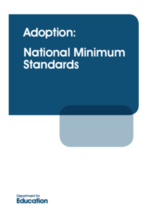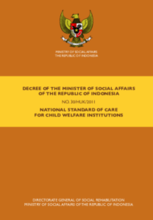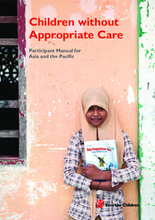Displaying 12811 - 12820 of 14139
This Advocacy Package explains what the IASC guidelines are and how they are to be used, highlights the key campaigning activities, key messages for communities, donors, UN Agencies and Non-Governmental organisations, clarifies terminology and provide ideas for country level implementation.
This situational analysis was commissioned by the Child Protection Initiative as a preliminary exercise to develop evidence-based recommendations to guide Save the Children in the Philippines to develop interventions. Priority areas are children in residential care, children in armed conflict and disasters, children in situations of migration (including for trafficking purposes), and children in exploitative and hazardous work conditions.
The first ever World report on disability, produced jointly by WHO and the World Bank, suggests that more than a billion people in the world today experience disability. This report provides the best available evidence about what works to overcome barriers to health care, rehabilitation, education, employment, and support services, and to create the environments which will enable people with disabilities to flourish. The report ends with a concrete set of recommended actions for governments and their partners.
This document contains the UK National Minimum Standards (NMS) applicable to the provision of adoption services.
This resource guide is based on and elaborates the UN Committee on the Rights of the Child General Comment No. 12, ‘The Right of the Child to be Heard.’ The aim of this handbook is to try to make easier the task of governments in moving that agenda forward.
This report, commissioned by Plan International, and supported by Consortium for Street Children (CSC) through collaboration and information, and written by GCPS, provides an analysis of the situation of street involved children, how their issues are currently addressed within legislative and policy frameworks, and highlights programmatic initiatives being implemented by International and local NGOs. Its aim is to inform and provide suggestions for improved practice by NGOs working with street involved children.
Indonesia’s National Standards of Care for Child Welfare Institutions is a crucial policy instrument, drafted in response to the recommendations of the United Nations Committee on the Rights of the Child, regulating the provision of alternative care for children.
Resource guide developed to support service providers in their work with parents, caregivers, and children to prevent child abuse and neglect
This manual offers a training session targeted at policy makers, professionals and paraprofessionals who are already working on programs to support children without appropriate care, or who may begin work in this area. This workshop focuses on children in developing contexts, who require support within their families and those who need an alternative care placement.
Shows how HIV-sensitive social protection can reduce vulnerability to HIV infection, improve and extend the lives of people living with HIV, and support individuals and households. While not specific to children, the paper includes sections on HIV and Child Protection and HIV and Early Childhood Development.









